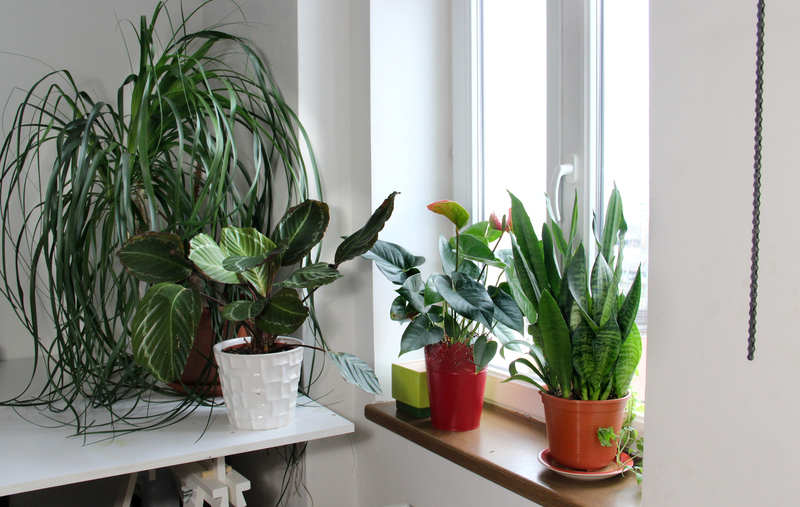Unveiling Nature's Secret: Transforming Waste into Lush Soil
Posted on 20/06/2025
Unveiling Nature's Secret: Transforming Waste into Lush Soil
The Magic Behind Waste-to-Soil Transformation
Imagine a world where household scraps, garden clippings, and organic leftovers aren't sent to overflowing landfills, but rather, become invaluable resources to nurture fertile soil. Nature has long held this secret -- the ability to convert what we discard into the foundation of new life. Today, we stand on the precipice of a green revolution as more individuals, communities, and organizations harness the power of composting and soil regeneration. In this article, we'll reveal nature's hidden secret for transforming waste into lush, healthy soil and explore how you can join this sustainable movement.

Understanding the Importance of Healthy Soil
Before diving into the processes and benefits of turning waste into rich soil, it's essential to highlight why this matters. Soil is more than just dirt; it's a complex, living ecosystem that acts as the foundation of the food chain.
The Critical Role of Soil
- Plant Growth: Soil provides essential nutrients, water, and a physical base for plant roots to thrive.
- Carbon Sequestration: Healthy soil absorbs and stores carbon, directly helping combat climate change.
- Biodiversity: Rich soils host billions of microorganisms, insects, and fungi essential for a balanced ecosystem.
- Water Filtration: Soils filter rainwater, preventing runoff and supporting clean waterways.
Depleted soils result in lower crop yields, increased need for chemical fertilizers, and can even contribute to desertification. Revitalizing our soils is crucial for food security, climate resilience, and a sustainable future.
What is Composting? Nature's Genius Recycling Process
At the heart of transforming waste into fertile soil lies the art and science of composting. Composting is a natural process that converts organic waste -- from kitchen scraps to lawn trimmings -- into a nutrient-rich, soil-like material. This transformation is made possible by billions of microbes, fungi, and detritivores (like earthworms) that break down complex organic matter.
The Stages of Composting
- Mesophilic Phase: Microorganisms begin breaking down sugars and starches, generating heat and starting decomposition.
- Thermophilic Phase: High temperatures kill pathogens and weed seeds while breaking down proteins, fats, and cellulose.
- Maturation Phase: The compost cools, and microbes refine the material into stable, humus-rich soil amendment ready for plant use.
Composting is nature's way of unveiling her secret: turning our so-called "waste" into the life-giving black gold that is humus.
Different Methods to Transform Waste into Lush Soil
There's more than one way to harness the secret of waste transformation. Whether you have a backyard, a balcony, or a whole community, there's a composting method for everyone.
Traditional Backyard Composting
- What you need: A dedicated spot, kitchen scraps, yard waste, and time.
- How it works: Alternate layers of "greens" (nitrogen-rich materials like food scraps, grass clippings) and "browns" (carbon-rich materials like leaves, twigs, cardboard).
- Maintenance: Keep moist and aerated by turning the pile every few weeks.
Vermicomposting: Worm Power
- Key players: Red wiggler worms (Eisenia fetida)
- Process: Worms eat food scraps, leaving behind nutrient-dense castings (vermicompost) that's ideal for plants.
- Benefits: Fast results, minimal odor, and great for small spaces.
Bokashi Composting
- What sets it apart: Uses special microbes to ferment food waste, including meats and dairy, in sealed containers.
- Outcome: Pre-compost that can be buried in soil to finish decomposition rapidly.
- Advantages: Compact, low odor, and efficient for indoor or apartment use.
Community Composting Initiatives
- Neighborhood bins: Shared collection sites allow urban dwellers without yards to participate.
- Urban farms: Turning local food scraps into healthy soil for city-grown produce.
- Educational benefits: Raising awareness and building greener neighborhoods.
Step-by-Step Guide to Composting at Home
Transforming kitchen and yard waste into lush, organic soil is easier than you might think. Here's a simple, practical guide to start composting at home and unveil nature's secret recycling process:
1. Choose Your Compost System
- Open pile or bin for larger yards.
- Tumbler or enclosed bin for convenience and faster results.
- Vermicomposting bin for indoor or balcony users.
2. Gather Compostable Materials
- Greens (Nitrogen-rich): Vegetable peels, fruit scraps, coffee grounds, grass clippings.
- Browns (Carbon-rich): Dry leaves, straw, cardboard, paper, wood chips.
*Avoid adding meat, dairy, oily foods, diseased plants, and pet feces to standard compost piles.*
3. Create Your Layers
- Start with a layer of browns.
- Add greens, then alternate more browns and greens.
- Moisten material to the consistency of a wrung-out sponge.
4. Monitor and Maintain
- Turn or mix the pile weekly to aerate.
- Check moisture regularly -- add water or dry materials as needed.
- Watch for smells; earthy is good, rotten or sour means it needs attention.
5. Harvest Your Compost
- In 2 to 12 months (depending on your method and attention), compost will be dark, crumbly, and sweet-smelling.
- Sift out large, undecomposed bits; use the finished product in gardens, pots, or even as top dressing for lawns.
Your journey of unveiling nature's secret and transforming waste into lush soil begins here!
The Science of Turning Waste into Black Gold
The composting process is a fascinating interplay of biology, chemistry, and physics. Microorganisms -- bacteria, fungi, and more -- break down organic matter, releasing carbon dioxide, water, heat, and nutrients. These nutrients, stabilized in humus, rebuild soil structure, improve water retention, and increase plant health.
Key Factors for Successful Composting
- Carbon-to-Nitrogen Ratio: Aim for roughly 3:1 browns to greens for optimum decomposition.
- Moisture: Too dry slows decomposition, too wet creates anaerobic conditions and odor.
- Oxygen: Regular turning introduces air, prevents foul smells, and supports aerobic microbes.
- Temperature: A properly managed pile heats up, speeding up the pathogen-killing and composting process.
Benefits of Transforming Waste into Lush Soil
The positive impacts of converting waste into fertile soil reach far beyond your backyard. Here's how composting aids sustainability:
Environmental Advantages
- Landfill Reduction: Over 30% of household waste is compostable, drastically reducing pressure on landfills.
- Climate Change Mitigation: Composting organic waste prevents methane emissions associated with landfilling.
- Soil Carbon Storage: Adds organic matter, locking up carbon in the ground.
Soil Health and Productivity
- Fertilizes Naturally: Supplies slow-release nutrients that nourish plants without synthetic chemicals.
- Boosts Water Retention: Improves the soil's structure, reducing water consumption.
- Fights Erosion: Dense, organic-rich soils prevent wind and water erosion.
Economic and Community Gains
- Save Money: Less spent on commercial fertilizers and soil amendments.
- Create Green Jobs: Community composting initiatives can create new employment opportunities.
- Strengthen Community Bonds: Collective projects foster education, cooperation, and pride.
Common Challenges & How to Overcome Them
Like any natural process, unveiling the secret of transforming waste into fertile soil comes with a learning curve. Here are some frequent composting obstacles and their solutions:
Odor Issues
Bad smells? Usually a sign of too much moisture or lack of oxygen. Add more dry browns and turn the pile more often.
Pests
Attracting rodents or flies? Avoid adding meat, dairy, and fats. Make sure food scraps are well covered and use rodent-proof bins where needed.
Slow Decomposition
Is your compost pile not breaking down? Add more greens, keep moist, and ensure regular mixing for aeration.
How to Use Your Homemade Compost
Once you've successfully unlocked the power of nature's secret for waste transformation, using compost will skyrocket your garden's productivity and greenery:
- Soil Amendment: Mix into flower and vegetable beds before planting for an organic nutrient boost.
- Lawn Top Dressing: Lightly spread over lawns to improve soil structure and vigor.
- Mulch: Apply a layer around trees and shrubs to suppress weeds and conserve moisture.
- Potting Mix Ingredient: Blend with soil and coco coir for healthy indoor and container plants.
Nature's Secret: The Circular Economy of Soil
Transforming waste into lush soil is at the heart of the circular economy -- an approach where resources are endlessly reused and cycled. Waste stops being a problem and becomes a solution, closing nutrient loops and rebuilding the natural fertility supporting all life on Earth.

Future Trends: Waste-to-Soil Innovations
The journey of unveiling nature's secret and regenerating soil doesn't stop with home composting. Across the globe, innovators are developing ways to supercharge waste transformation for urban farming, green roofs, and climate-smart agriculture.
- Biochar: Charred plant matter locks carbon in the soil for centuries, boosting fertility while fighting climate change.
- Industrial Composting: Advances allow for curbside organic waste pick-up and large-scale processing, closing the loop for entire cities.
- Smart Composting Tech: Sensors and AI optimize conditions for faster, more efficient soil creation.
The future is rich, green, and powered by the transformation of waste into soil.
Conclusion: Start Transforming Waste into Rich Soil Today
In every apple core, coffee ground, and fallen leaf lies the untapped potential to restore our earth. By unveiling nature's secret -- the ancient, powerful process of transforming waste into lush, fertile soil -- we all hold the key to a sustainable, thriving future.
Whether you start a small kitchen-bin compost or join a community initiative, you're helping to build a resilient world, one handful of soil at a time. Turn your waste into wealth and become a steward of the planet today!
Frequently Asked Questions
- What cannot be composted? Avoid meats, dairy, oily foods, chemically treated wood, and pet feces in most home composting systems.
- How long does it take to get finished compost? With proper care, finished compost may be ready in as little as 2-6 months.
- Does composting attract pests? Not if you follow best practices -- covering food scraps, avoiding certain items, and maintaining balance deter most pests.


